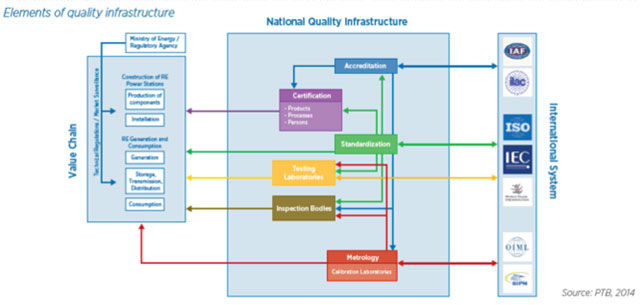Quality and standards
About
IRENA supports Member Countries in designing and implementing a robust quality infrastructure for renewable energy and enabling technologies, providing data via the online international repository on standards (INSPIRE). IRENA also engages and works in close co operation with experts on the development of a quality infrastructure and standards, organising and participating in workshops, conferences and seminars.
National policies and international initiatives to support the development, deployment and diffusion of renewable energy technologies are crucial to accelerate the transition towards a secure, cost-effective and sustainable energy system.
One of the challenges for the deployment of renewables is the perceived technical risk. Investors might be deterred if the reliability of these technologies is in question. Operationalising quality assurance and international technical standards via testing and certification can address this risk and at the same time spur technological improvement.
Quality assurance consists of all activities which provide confidence that a product or service will meet the expectations of consumers, investors and other stakeholders. For renewables, standardisation plays a crucial role in this process since it provides common rules, guidelines and characteristics. Standards are intended to ensure that products and services perform as expected, and rely on the mechanisms to verify that such requirements are fulfilled, such as testing, certification and inspection.
Quality assurance mechanisms required an established quality infrastructure, that is a dynamic network of stakeholders. A well-functioning quality infrastructure can attain quality assurance and generate confidence in the market about the conformity of products, processes and services. A quality infrastructure incorporates standards, metrology, testing, certification, inspection, accreditation and quality management systems.
Countries are encouraged to develop a national quality infrastructure and to follow standards to increase the level of technological quality and safety. The diffusion of renewable technologies with poor quality and safety could undermine the sustainable energy transition. Following standards and implementing a quality infrastructure can also ensure socio-economic benefits. The job market may require increased specialisation among workers, with advanced skills, competences and knowledge. These characteristics may become increasingly desirable, creating new jobs and entailing highly skilled professions possibly attaining higher wages.






